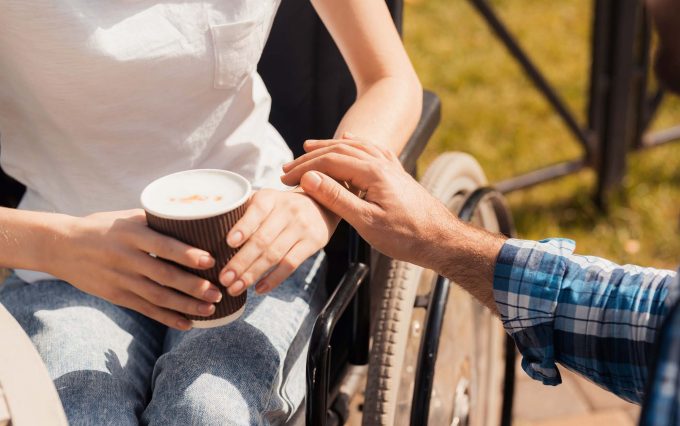
15th February 2022
Non-Fiction
15 minutes read
I’m Here, I’m Disabled, Get Used To It

15th February 2022
15 minutes read
(Sex On Wheels?) (Sexual Healing?)
You’re so pretty for a girl in a wheelchair.
Angelique Vito has to laugh; it’s just one of the more memorable things well-meaning people have said to her. Oh, it’s so unfortunate you can’t have children. Oh, you’re such an inspiration. “They see me in this chair and the thinking is, Oh, poor thing, you can’t have sex, you can’t have kids…I mean, what’s the thinking there? I can’t walk so I don’t have my period?”
Vito, 28, just got her Masters in social work; she has cerebral palsy and lives with her family in Westchester County. (We met several years ago when she read the book about my autistic son Gus, To Siri With Love; she knows my hopes and worries for him, particularly about finding love, are never far from my mind.) So far she has had several “situationships” but no lasting partners. There is good reason to believe that will change. But the societal obstacles she and millions like her face are daunting
Yes, it’s very nice that in the US ‘accessibility’ is the law of the land (in policy, if not always in practice), that there are programs and precedents for employing people with a variety of disabilities. That is the result of years of political activism, and anybody who wants to learn a little more about this movement needs to watch the award-winning documentary Crip Camp right now (currently streaming on Netflix).
But the campaign against ableism – discrimination based on a person’s physical appearance or cognitive differences – is entering a new chapter as the disabled battle to be recognized as equal sexual citizens, with control over, and access to, their sexuality and to fulfilling sexual relationships. It is a fight right up there with gender and racial equality.
In 2012, the World Health Organization declared that sexuality is a basic need, an aspect of being human that cannot be separated from other aspects of life. Still, study after study of attitudes of the non-disabled towards the disabled show how many people have misconceptions about the sexuality of people with various disabilities – the primary one being that they simply don’t have sexuality.
And when an individual’s sexuality – their humanity – is denied, bad things happen. The next step is dehumanization. According to one study at the University of Michigan, as many as 40% of women with physical disabilities experience sexual assault or physical violence in their lifetimes, and more than 90% of all people with developmental disabilities experience sexual assault. There are many reasons for these appalling statistics, including their vulnerability at the hands of caretakers, but additionally there’s this: disabled people don’t have equal access to sexual health care and sexual education, and when there is an assault, they are often not believed.
So perhaps it’s no surprise that there is a quiet civil rights movement going on, fueled by the social media. The disabled are asking all of us to see them as potential sexual and romantic partners – and moreover, to see their disability not as a tragedy, but as an identity.
Fuck Pity/Crip Pride!
That’s the cri de coeur of the disability movement on social media. Like the black and gay movement before them, they have co-opted the language of the oppressor as a kind of big F You to the haters.
Today, there are dozens of “disability influencers” on the Internet. People like Melissa Blake, with over 250,000 followers who, born with Freeman-Sheldon syndrome, writes about disability, relationships, and popular culture; Madison Lawson (@wheelchairBarbie) who covers fashion and beauty for a variety of women’s magazines (and observes that having a tiny, gnarled body has actually increased her love for clothing since it’s more difficult to get clothes that fit correctly); or Alex Dacy (@wheelchair_rapunzel), a 20-something Irish woman with spinal muscular atrophy, who promotes disabled body acceptances and sells t-shirts in her online shop. The shirts are not for the shy. They feature slogans like “Disabled Bodies are Beautiful Bodies” and “Roses are red/Violets are blue/Wheelchairs are sexy/Enjoy the view.” Though her fiercest T, in my view, is “Love Your Genes” – quite the radical statement for those with a genetic disorder.
And then there’s Andrew Gurza, a gay disability activist and occasional porn star with cerebral palsy; he hosts a podcast called “Disability After Dark” and is developing a line of sex toys called Handi “for anyone with hand limitations.”
In this nascent Pride movement, language matters. “Disabled” is fine. “Crip” is fine (if you’re disabled). One woman is trying to popularize the term ‘Medically Fascinating.’ You know what’s not fine? Patronizing euphemisms. “If I can get a lover to whisper something like, “Oooooooh, you’re a hot cripple” in my ear during sex, I love it even more because it means they understand how important my disabled identity is to me even in the bedroom,” Gurza writes in the anthology he co-edited, The Handi Book of Love, Lust and Disability (p. 68). “Conversely,” he adds, “ if you call me “handicapable” in the bedroom, you probably won’t get to touch my joystick.”
When writing about sexual experiences, a consistent theme for many in the community is how chronic pain is a part of daily life, and sexual pleasure and orgasm can temporarily hold disability related pain at bay. Some compare it to prescription medication. “Pain is a constant,” notes “Alex,” a man with Friedreich’s Ataxia, a progressive disease of the nervous system. “Regardless of how it manifests – physically, mentally, or emotionally – pain is present. F*ck pain, literally! F*ck pain with pleasure. It is up to us to create enough pleasure to drown out the pain (or, at least, enough that the two can co-exist).”







